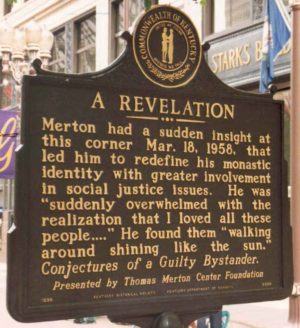My earliest memory of Thomas Merton was as a teenager when I was visiting a book exchange with my mom. She saw his book, The Seven Storey Mountain, on the shelf and went on and on about Merton. I really wasn’t interested at that point in my life but over the years I never forgot that experience and book title. Later, as an adult, when visiting Louisville, Kentucky, I came across the historic marker on the corner of Fourth and Walnut streets where Merton had an epiphany moment. On that busy street, he realized that he loved all the people around him. (Read Conjectures of a Guilty Bystander for more information.)
During most of July 2017, I was in Chicago to attend workshops offered by the National Religious Vocation Conference (NRVC) for Vocation Directors. I left the small population of around 59,000 in Owensboro to immerse myself into the big city population of about 2.7 million. My mode of transportation while in Chicago was mostly on foot and I encountered many people on my daily walks. There was an array of people from business men and women in fine suits and dresses to those who were dirty and shabbily dressed holding a cup for any spare change a person may give. On one of my walks, while watching all these people, unique in their own way, I had a small understanding of how Merton must have felt in March 1958. My sense was not so much that I loved these people (which I should) but instead an awareness that God loves these people…each person I passed on the street is a beloved child of God.
With so much violence, war, and hate in the world how do we take the initiative to convince others to love, as God loves us? Almost 60 years after Merton’s revelation of love, how can we work to change our corner of the world?
The words of the hymn Ubi Caritas are a great place to start:
Where charity and love prevail, there God is ever found;
Brought here together by Christ’s love, by love are we thus bound.
With grateful joy and holy fear His charity we learn;
Let us with heart and mind and soul now love him in return.
Forgive we now each other’s faults as we our faults confess;
And let us love each other well in Christian holiness.
Let strife among us be unknown, let all contention cease;
Be His the glory that we seek, be ours His holy peace.
Let us recall that in our midst dwells God’s begotten Son;
As members of His body joined, we are in Him made one.
No race or creed can love exclude, if honored be God’s name;
Our family embraces all whose Father is the same.
Hymn: Ubi Caritas, tr. Omer Westendorf (1961)
Tune: CHRISTIAN LOVE, CM, by Pau